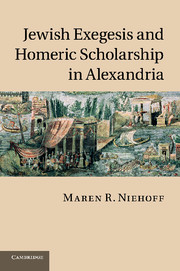Book contents
- Frontmatter
- Contents
- Acknowledgements
- List of abbreviations
- 1 Setting the stage
- Part I Early Jewish responses to Homeric scholarship
- Part II Critical Homeric scholarship in the fragments of Philo's anonymous colleagues
- Part III The inversion of Homeric scholarship by Philo
- 8 Literal methods of Homeric scholarship in Philo's Allegorical Commentary
- 9 Philo's Questions and Answers as a manual of instruction
- 10 Philo's Exposition of the Law at a significant distance from Alexandrian scholarship
- Epilogue
- References
- Index of Greek terms
- Index of sources
- Index of modern authors
- General index
8 - Literal methods of Homeric scholarship in Philo's Allegorical Commentary
Published online by Cambridge University Press: 03 May 2011
- Frontmatter
- Contents
- Acknowledgements
- List of abbreviations
- 1 Setting the stage
- Part I Early Jewish responses to Homeric scholarship
- Part II Critical Homeric scholarship in the fragments of Philo's anonymous colleagues
- Part III The inversion of Homeric scholarship by Philo
- 8 Literal methods of Homeric scholarship in Philo's Allegorical Commentary
- 9 Philo's Questions and Answers as a manual of instruction
- 10 Philo's Exposition of the Law at a significant distance from Alexandrian scholarship
- Epilogue
- References
- Index of Greek terms
- Index of sources
- Index of modern authors
- General index
Summary
In this section of the book Philo's own work will be investigated in light of Homeric scholarship. Thus far, it has become clear that he was very critical of colleagues who adopted rigorous scholarly methods, either reading Scripture as literature in a general Aristotelian sense or engaging in text-critical studies in the style of Aristarchus. It now remains to be seen whether Philo's intimate familiarity with such scholarly methods is echoed in his own Bible exegesis. I shall argue that he did not ignore them, as may be expected, but rather used them in a sophisticated and highly innovative fashion to construct a separate discourse of Jewish hermeneutics. This is especially the case in his Allegorical Commentary, which will be the focus of the present chapter. Addressing an audience used to critical scholarship on the literal level, Philo seriously studied textual problems in this series of commentaries in order to justify his own allegorical interpretations. He thus created a new synthesis of approaches and conveyed a hitherto overlooked theory of allegory.
Although little attention has thus far been paid to the dimension of literal scholarship in Philo's Allegorical Commentary, Yehoshua Amir and Adam Kamesar have made significant progress on the question whether Philo regarded Scripture as a piece of literature. Amir has stressed the ambiguity of Philo, who sometimes speaks of Scripture as a divinely inspired text, while on other occasions addressing Moses as the author of a literary work.
- Type
- Chapter
- Information
- Jewish Exegesis and Homeric Scholarship in Alexandria , pp. 133 - 151Publisher: Cambridge University PressPrint publication year: 2011



